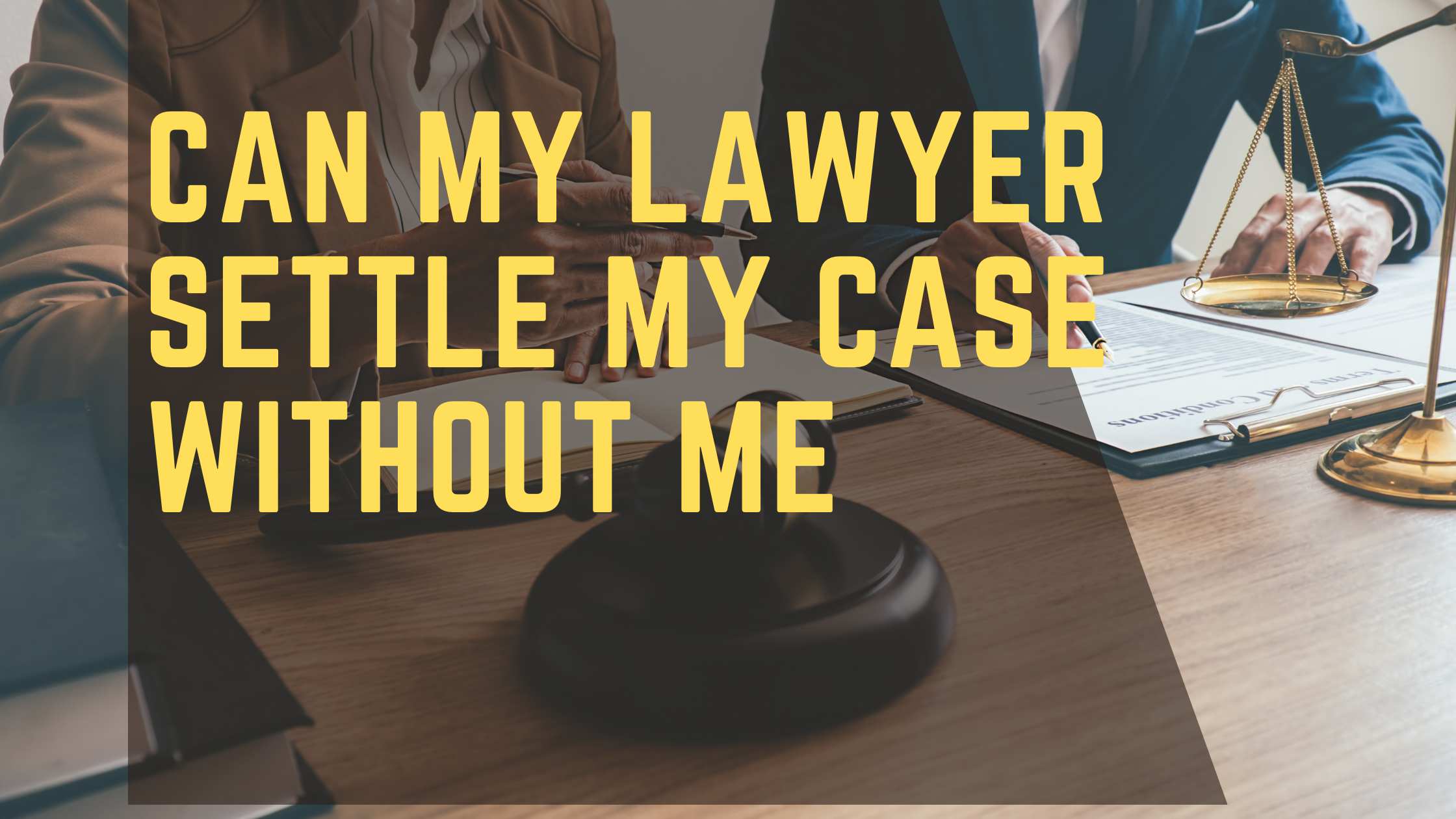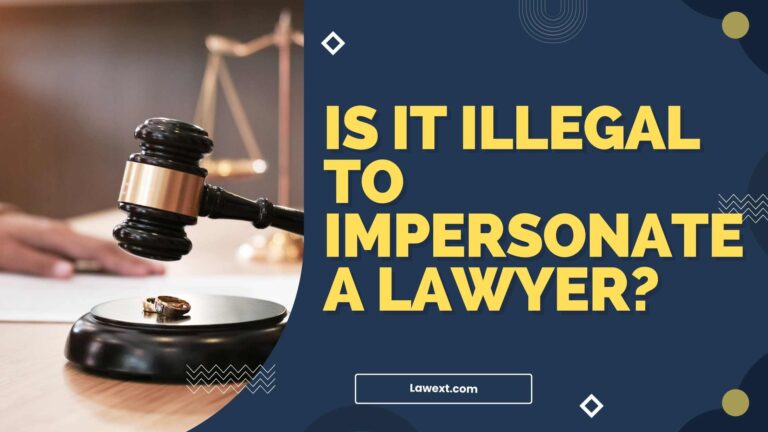Can My Lawyer Settle My Case Without Me?

Yes, a lawyer can settle a case without your involvement, but it requires your consent and authorization. When you’re involved in a legal dispute, you might wonder if your lawyer can make decisions and settle the case on your behalf.
The answer is yes, but only with your permission. A lawyer has the authority to negotiate and enter into a settlement agreement without your direct involvement, but they need your consent before making any decisions that could affect the outcome of your case.
Can My Lawyer Settle My Case Without Me? This means that you have the final say in whether or not you agree to settle, and your lawyer should keep you informed and consult with you throughout the settlement process. It’s important to maintain open communication with your lawyer to ensure that your interests are protected and that you are involved in the decision-making process.
Understanding The Role Of A Lawyer In Settling A Case
A lawyer can negotiate and settle a case without the client’s direct involvement, but it’s crucial for the client to be informed and provide consent. Understanding the role of a lawyer in settling a case can help ensure the best outcome for the client’s interests.
When it comes to legal matters, the role of a lawyer extends far beyond just representing their client in court. One of the essential responsibilities of a lawyer is to settle a case on behalf of their client, if it is in the best interest of the client. Understanding the role of a lawyer in settling a case is crucial for any individual seeking legal assistance.
Exploring The Lawyer’s Responsibility To Their Client
A lawyer has a fiduciary duty to act in their client’s best interest and protect their rights throughout the legal process. This responsibility extends to settling a case. The lawyer’s primary goal is to achieve the best possible outcome for their client, whether through negotiation or litigation. By responsibly exploring all available settlement options and assessing the potential risks and benefits, a lawyer works towards securing a favorable resolution.
In addition, a lawyer is responsible for keeping their client informed about the progress of the case, discussing the available settlement options, and advising them on the potential advantages and disadvantages of each option. Ultimately, the decision to settle or proceed to trial rests with the client, and a lawyer must respect their client’s wishes and provide guidance accordingly.
Examining The Lawyer’s Authority To Settle A Case On Behalf Of Their Client
A lawyer typically has authority to settle a case on behalf of their client, granted that they have obtained the necessary consent and instructions from the client. This authority is derived from the attorney-client relationship and the powers entrusted to the lawyer by the client. Once the lawyer possesses the client’s explicit authorization, they can engage in negotiations and reach a settlement that best aligns with the client’s objectives.
However, it’s important to note that a lawyer cannot settle a case without their client’s knowledge or consent. Open and clear communication between the lawyer and their client is crucial throughout the entire settlement process. The client should be kept informed and involved in the decision-making process, allowing them to make informed choices about whether to accept or reject any settlement offers.
In conclusion, understanding the role of a lawyer in settling a case is vital for clients seeking legal assistance. By acknowledging the lawyer’s responsibilities to their client and the authority granted to them, individuals can make informed decisions about their legal matters. Maintaining a strong client-lawyer relationship based on trust and communication is key to achieving a satisfactory resolution through settlement.

Credit: courtroomlaw.com
Factors Influencing A Lawyer’s Decision To Settle A Case Without The Client
Factors Influencing a Lawyer’s Decision to Settle a Case Without the Client
Assessing The Client’s Availability And Involvement
Before making a decision to settle a case without the client, lawyers must carefully assess the client’s availability and involvement in the case. This includes considering the client’s ability to participate in the negotiation process, attend meetings, and provide input on settlement discussions. A lawyer may choose to settle a case without the client if the client is unavailable or unresponsive, and if the lawyer believes it is in the best interest of the client to proceed with the settlement without delay.
Considering The Client’s Trust In The Lawyer’s Judgement
A crucial factor influencing a lawyer’s decision to settle a case without the client is the level of trust the client has in the lawyer’s judgement and expertise. If the client has given the lawyer full authorization to make settlement decisions on their behalf, and has expressed confidence in the lawyer’s ability to negotiate effectively, the lawyer may proceed with settling the case without the client’s direct involvement. This trust can empower the lawyer to act in the client’s best interest while considering the settlement options.
Evaluating The Lawyer’s Expertise And Experience In Negotiations
Another significant consideration is the lawyer’s expertise and experience in negotiations. If the lawyer is highly skilled and has a proven track record of successful negotiations, the client may feel comfortable allowing the lawyer to handle the settlement process independently. The lawyer’s ability to effectively represent the client’s interests in settlement discussions and secure a favorable outcome can substantially impact the decision to proceed without direct client involvement.
The Client’s Right To Participate In Settlement Decisions
Your lawyer cannot settle your case without your participation. As a client, you have the right to be involved in settlement decisions to ensure your best interests are represented and the outcome aligns with your goals and preferences.
Explaining The Importance Of Client Consent
When involved in a legal case, it is crucial for the client to understand their right to participate in settlement decisions. The client’s consent is vital as it not only ensures their involvement but also has significant implications for the outcome of the case. By explaining the importance of client consent, attorneys can empower their clients and build a stronger attorney-client relationship.
By obtaining the client’s consent, attorneys are able to align their goals with those of their clients. This allows for a collaborative approach where both parties are involved in the decision-making process. Clients who actively participate in the settlement decisions feel more engaged and are more likely to be satisfied with the outcome.
Moreover, the client’s consent is crucial for the attorney’s ethical obligations. Attorneys have a duty to act in the best interests of their clients and to maintain open communication throughout the legal process. By involving clients in settlement decisions, attorneys fulfill their ethical obligation of promoting the client’s autonomy and ensuring transparency.
Understanding The Legal And Ethical Implications
When an attorney settles a case without the client’s consent, it raises significant legal and ethical concerns. From a legal standpoint, settling a case without the client’s involvement may potentially violate the attorney’s duty to act in the client’s best interests. Clients have the right to be fully informed about the details of their case and to have a say in the settlement negotiations.
From an ethical perspective, attorneys are bound to follow professional rules that prioritize client autonomy and informed decision-making. The American Bar Association’s Model Rules of Professional Conduct emphasize the importance of client consent and the attorney’s duty to involve clients in significant matters, including settlement decisions.
By disregarding the client’s right to participate in settlement decisions, an attorney runs the risk of facing disciplinary actions, damaging their professional reputation, and even facing legal consequences. Therefore, it is crucial for attorneys to understand the legal and ethical implications of excluding clients from settlement decisions.

Credit: www.pintas.com
Communication And Collaboration Between Lawyer And Client
One of the crucial elements in any legal case is the communication and collaboration between the lawyer and the client. This dynamic relationship plays a significant role in the success of settling a case without the client’s direct involvement. Stressing open and transparent communication and encouraging active involvement in settlement discussions are key factors that can help achieve a favorable outcome.
Stressing Open And Transparent Communication
When your lawyer can settle your case without your direct involvement, open and transparent communication becomes paramount. You need a lawyer who will keep you well-informed throughout the settlement process, ensuring you have all the necessary information to make educated decisions. Clear and honest communication allows you to understand the progress of your case and any potential settlement offers on the table.
To facilitate this communication, your lawyer should:
- Provide regular updates on the status of your case
- Explain the legal process in simple terms
- Share any settlement offers received from the opposing party
- Discuss the strengths and weaknesses of your case
Through open and transparent communication, you can stay informed about the progress of your case and contribute valuable insights when necessary. This collaborative approach will ensure that the settlement negotiations align with your goals and expectations.
Encouraging Active Involvement In Settlement Discussions
While your lawyer may have the expertise to negotiate on your behalf, it is important to stay actively involved in settlement discussions. Your input can play a crucial role in deciding whether to accept or reject a settlement offer. By actively participating in these discussions, you can help your lawyer better understand your priorities, concerns, and desired outcomes.
Your lawyer should:
- Seek your input and actively listen to your concerns
- Consider your preferences and goals when crafting settlement strategies
- Explain the potential pros and cons of accepting a settlement offer
Having open lines of communication allows for a collaborative approach and empowers you to make informed decisions about your case’s settlement. Your lawyer should foster an environment where you feel comfortable expressing your opinions and where your input is valued.
However, it is also important to trust your lawyer’s expertise and legal judgement. They have the experience to navigate the complexities of settlement negotiations and can guide you towards the best possible outcome. By maintaining a strong relationship based on open communication and active involvement, you and your lawyer can work together towards achieving a successful settlement without you being directly involved in every step.
Steps Clients Can Take To Ensure Active Involvement In Settlement Negotiations
In settlement negotiations, it’s essential for clients to actively participate in the process to ensure their interests are adequately represented. By taking proactive steps, clients can play an active role in working towards a favorable settlement. Here are some key actions clients can take to ensure their involvement in the settlement negotiations:
Maintaining Regular Contact With The Lawyer
Clients should maintain open communication with their lawyer throughout the settlement negotiation process. Regular updates and discussions will help ensure that the client’s input is considered and reflected in the negotiation strategy.
Providing Necessary Information And Documentation
It is vital for clients to provide all essential information and documentation to their lawyer promptly. This includes any relevant evidence, financial records, medical reports, and any other pertinent details related to the case. By furnishing this information, clients enable their lawyer to present a strong case during negotiations.
Expressing Concerns And Preferences
Clients should openly communicate their concerns, preferences, and goals to their lawyer. This includes discussing desired outcomes, as well as any reservations about specific settlement terms. Clear communication empowers clients to have a significant role in shaping the negotiation strategy and reaching an agreement that aligns with their best interests.

Credit: www.morrisbart.com
Conclusion
Ultimately, while your lawyer may have the authority to settle your case without your direct involvement, it’s crucial to ensure communication and alignment with your best interests. Trusting your legal representative is essential, yet staying informed and engaged in the process will help guarantee a satisfactory outcome.
Amelia Justiceberg, a distinguished legal luminary, thrives on the intersection of empathy and legal acumen. As a prominent family law attorney, she orchestrates compassionate resolutions amidst complex dynamics. Justiceberg's courtroom finesse and dedication to fairness define her practice. Beyond litigation, she ardently advocates for social justice, solidifying her reputation as an influential force in the legal landscape.






